Antioxidant rich foods are a vital part of a healthy diet, and can help combat the negative effects of aging. Fruits are loaded with vitamins and antioxidants. But what fruits highest in antioxidants are good for you? This article will highlight the best fruit sources of antioxidants. And why should you eat them?
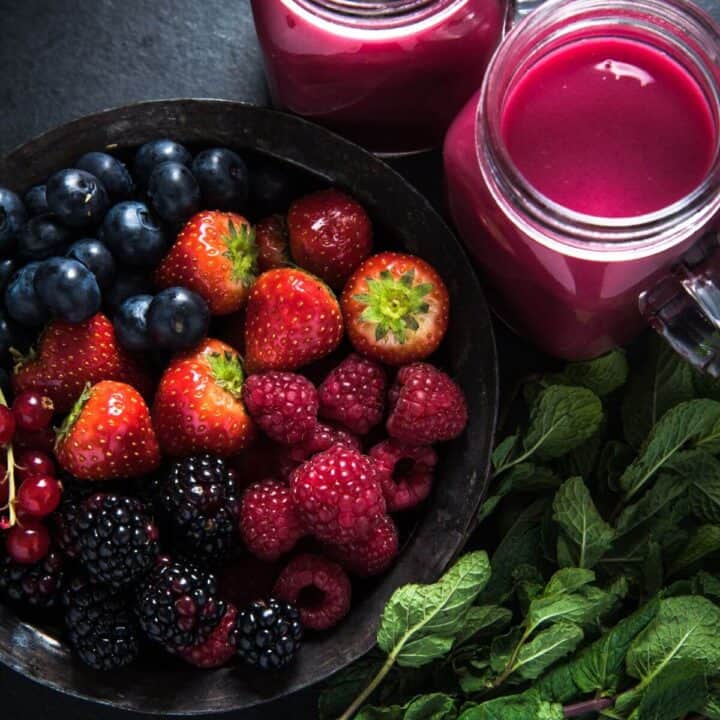
Table of Contents
Fresh fruit is sweet and refreshing. Plus, since they're portable and can be eaten with minimal preparation, they make a perfect snack.
But did you know that have many health benefits including being rich in antioxidants? Let's discuss.
🫐 Fruits Highest In Antioxidants
Antioxidants are substances that neutralize free radicals, which are naturally occurring molecules that damage cells in the body.
Free radicals are involved in many diseases, including cancer and heart disease.
Antioxidants help protect cells from free radical damage by binding with free radicals and removing them from the body.
So, this explains why they are vital in the fight against aging.
🍓 Vitamin Rich Fruits Rich In Antioxidants
Fruits contain many antioxidants, both vitamins and minerals, including vitamin C and potassium. Fruits also contain phytochemicals, polyphenols in flavonoids and carotenoids.
In short, these are believed to be important antioxidants in humans.
Firstly, all fruits contain vitamins and minerals. This is why it is recommended to increase your intake of fruits and vegetables.
This article will explain which fruits have the highest levels of antioxidants, as well as which ones you should eat more of.
💦 Water Soluble Versus Fat Soluble Antioxidants
Antioxidants in fruit are divided into two categories: water-soluble and fat-soluble.
The former have a short half-life in the human body.
While the latter can reach a higher concentration in the body.
💧Water-Soluble Antioxidants Include:
Flavonoids
Found in dark-skinned fruits, like blackcurrants and raspberries.
Tocopherols
(Vitamin E). Found in plants with high vitamin E content, like almonds, peanuts, sunflower seeds and vegetable oils.
Quercetin
Found in apples and onions.
🫓 Fat-Soluble Antioxidants Include:
Lipoic Acid
This antioxidant is found in beetroot, broccoli and lentils.
Silymarin
This antioxidant comes from milk thistle seeds. A plant-based antioxidant with a stronger antioxidant effect than vitamin C.
Selenium
Typically found in wheat and seafood.
Glutathione
Glutathione is typically from animal protein (like beef or fish). This major antioxidant found in body tissue and protects cells from damage caused by free radicals.
Turmeric
A powerful antioxidant found in curry.
Carotenoids
A group of compounds found in plant foods, like carrots, tomatoes and kale.
Lycopene
Found in red-skinned fruits like tomatoes, watermelon and pink grapefruit.
Flavonoids
A group of compounds found in plants and many vegetables.
Beta-Carotene
This precursor to vitamin A is found in carrots.
Anthocyanins
Found in red, purple, blue and black vegetables.
Astaxanthin
Found in salmon.
Vitexin
This apigenin flavone glucuoside, which is a compound found in chaste tree, passionflower, fenugreek seeds, and pearl millet.
Resveratrol
Found in red grapes and red wine, as well as in peanuts, cranberries, blueberries and raspberries.
Choline
A nutrient found in eggs, fish and legumes.
Soy Protein
Found in tofu.
Alpha-Linolenic Acid (ALA)
An omega fatty acid.
⁉️ What Are Antioxidants?
Antioxidants are natural chemicals that prevent the oxidation of other molecules and create free radicals.
For example, antioxidant molecules can be found in many foods, including fruits, vegetables, nuts, grains, and spices.
There are various antioxidants, which have different effects on the body.
For instance, some antioxidants work more directly with free radicals to neutralize them and prevent damage, while others prevent free radicals from being formed.
Still, others work by preventing free radicals from triggering damage to other cells in the body.
Therefore, antioxidants protect your body from free radical damage that can cause chronic diseases like cancer, heart disease, and Alzheimer's.
🩺 Who Is At Risk Of High Levels Of Free Radials?
Free radicals are formed when a cell is exposed to oxygen.
In addition, certain genetic factors, smoking, pollution, and exercise, also increase the number of free radicals in your body.
Non-communicable diseases like cancer, cardiovascular disease, and oxidative stress increasingly cause diabetes due to free radicals.
Who is at risk of high levels of free radicals? Many people are genetically predisposed to having low levels of antioxidants in their body.
These people often include those who are:
- Smokers
- Obese
- Sedentary (lack of exercise)
- On chemotherapy or radiation treatment.
- Elderly
⁉️ What Are The Health Benefits Of Antioxidants In Fruits?
Antioxidants are natural substances that the body uses to combat oxidative stress, or free radical damage.
Moreover, this type of stress is caused by toxins in foods and the environment. As well as exposure to excess radiation.
Secondly, antioxidants can help the body ward off and repair damage caused by various toxins.
There are many types of antioxidants, but some common ones include vitamin C, vitamin E, lycopene and carotenoids.
Although the functions of antioxidants may vary across individuals, each plays an important role in protecting cells from oxidative stress.
Most importantly, fruits are rich in antioxidants. So, what fruits are rich in antioxidants?
🍎 Antioxidant-Rich Fruits
So, which fruits are loaded with high antioxidants? Here is a list of the fruit high in antioxidant.
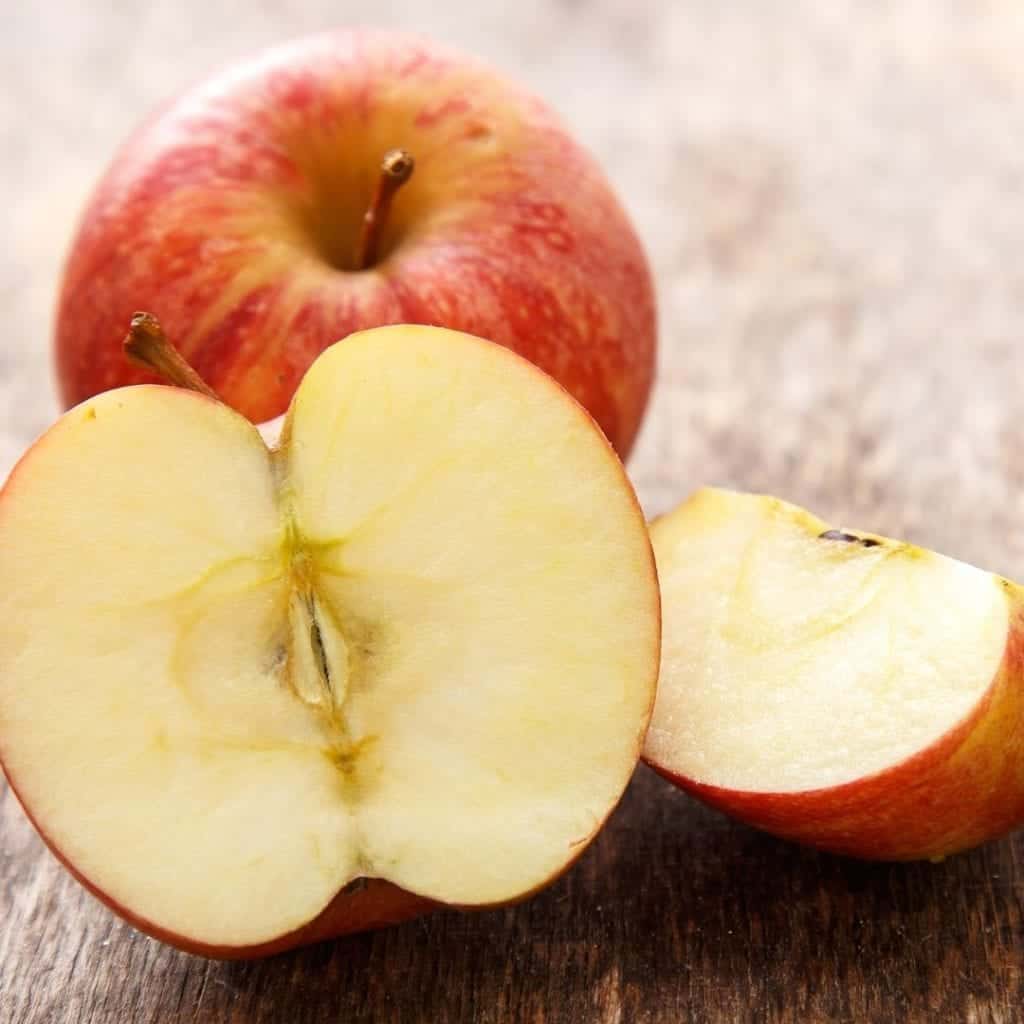
Apples
Beautiful apples are crunchy, juicy, and come in various flavors. A medium apple contains 95 calories and high levels of antioxidants, flavonols, and vitamin C, along with plenty of fiber.
Above all, apples are a simple vitamin filled fruit with impressive health benefits.
Apple Health Benefits
In addition to being an impressive source of antioxidants, apples also have the following health benefits:
- Detoxifying your body.
- Enhancing your brain function.
- Regulating your blood glucose levels.
- Strengthening your heart.
- Supporting healthy digestion.
Blueberries
These delicious berries are a total super fruit. For example, blueberries are also a rich source of phytonutrients, vitamins and minerals.
They're also loaded with antioxidants called anthocyanins, which give blueberries their characteristic hue.
Blueberries have been shown to reduce inflammation by reducing the activity of pro-inflammatory enzymes.
📥 GET THIS RECIPE IN YOUR INBOX 📥
One study shows blueberries significantly improved vision in older adults.
Blueberries have been shown to reduce the risk of cancer by inhibiting cell proliferation. Therefore, blocking the growth of certain cancer cells.
Blueberry Health Benefits
Blueberries are also loaded with antioxidants called anthocyanin. So, this gives blueberries their characteristic hue.
This phytonutrient has important health benefits, including:
- Treating digestive disorders and inflammation.
- Protecting eyesight.
- Protecting against cancer.

Cherries
Tasty cherries have a unique taste, sweet but tangy. And contain simply 87 calories per cup.
Most importantly, they're an excellent source of the antioxidants manganese and vitamin C.
In addition, cherries contain considerable amounts of fiber and potassium.
Cherry Health Benefits
When it comes to health, cherries do a lot more than fight free radicals.
For example, some other main ways they enhance your health include:
- Enhancing your sleep quality.
- Lowering your blood pressure.
- Promoting healthy weight loss.
- Reducing inflammation in your body.
- Relaxing your muscles.
Blackberries
Beautiful blackberries are also a terrific source of antioxidants. The anthocyanins in blackberries are among the richest in antioxidant activity of any fruit.
The research has shown they can reduce oxidative stress and inflammation. As well as protect against cancer.
Blackberry Health Benefits
Blackberries health benefits include:
- Fighting inflammation.
- Promoting healthy joints.
- Boosting immune system production.
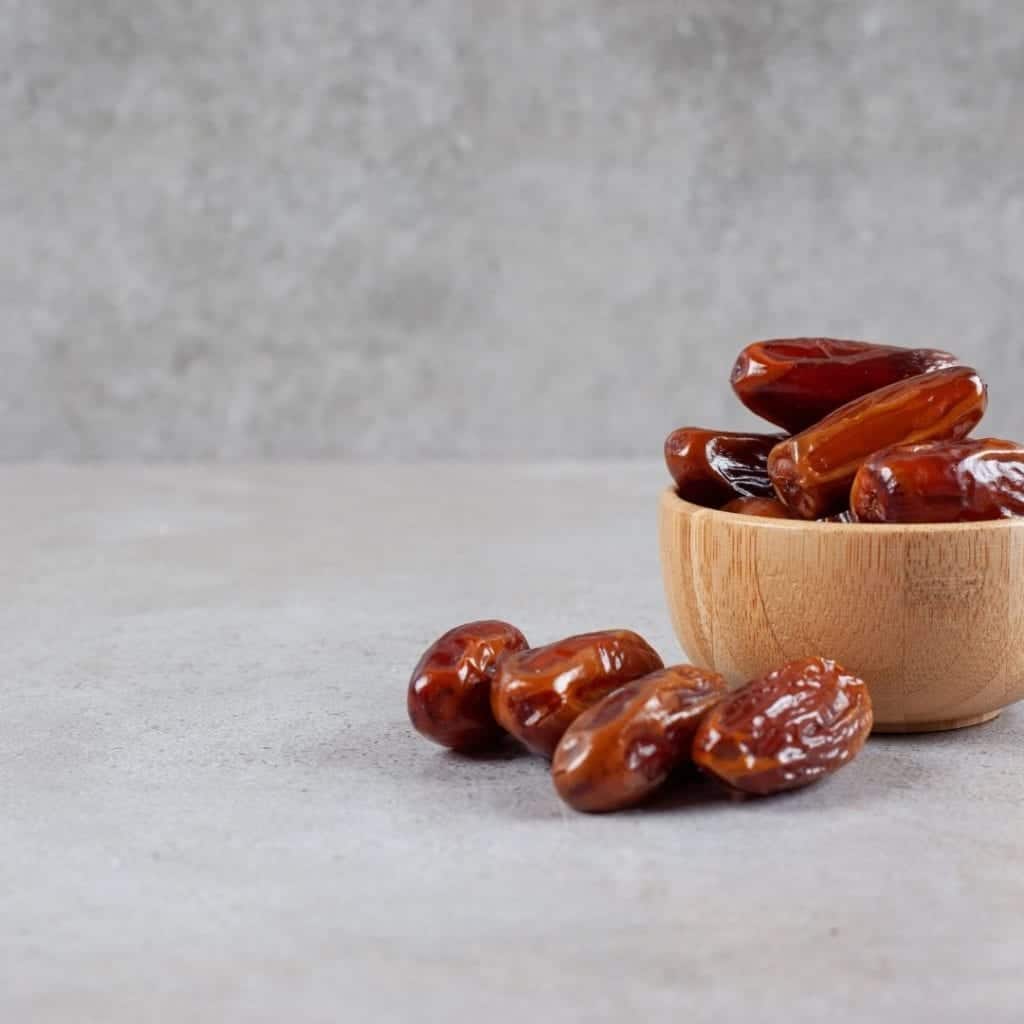
Dates
Delicious dates contain 66 calories each and have a sweet, syrupy flavor. They're rich in antioxidants, anthocyanins, carotenoids, copper, manganese and phenolic compounds. They also contain many B vitamins, fiber, magnesium and potassium.
Protecting against oxidative damage is only one of the many positive aspects of dates.
These tasty fruits also boost your body by these health benefits associated with high antioxidant levels.
Enhance Energy Levels With Dates In Your Diet
Studies have shown dates help reduce fatigue and enhance energy generation.
So, try adding a few chopped dates to your oatmeal in your morning for a natural burst of energy.
Dates Help Prevent Anemia
Dates have a lot of iron and vitamin B12. Studies have indicated that eating a few dates daily can provide your body with your daily intake.
In addition, dates are rich in vitamin C, so this will also help with iron absorption.
Dates Protect Against Allergies
Research has shown that the addition of dates can help decrease inflammation markers and help those who suffer from allergic rhinitis.
Strengthen Bones And Teeth While Eating Dates
The rich mineral content of dates like manganese, copper, and even selenium helps strengthen our bones and even our teeth.
So, if you are concerned about developing osteoporosis, be sure to include some dates into your diet.
Dates Strengthen The Nervous System
The high potassium content in dates plays a vital role in strengthening the nervous system.
Our nervous system is responsible for roles like heart rate, muscular function, and even our lung function.
Raspberries
Tasty raspberries are packed with variety flavonoids that are powerful antioxidants. Likewise, research suggests these compounds reduce inflammation and protect against oxidative stress.
Raspberries and black raspberries are rich in antioxidants, especially anthocyanins.
For example, research shows they can reduce oxidative stress and inflammation, as well as protect against cancer.
Flavonoids have been shown to support healthy blood vessels. The dietary flavonoids in raspberries are among the most powerful antioxidants found in any fruit.
Raspberry Health Benefits
Raspberries health benefits include:
- Antioxidant rich.
- Reduce inflammation.
- Boost immune system production.
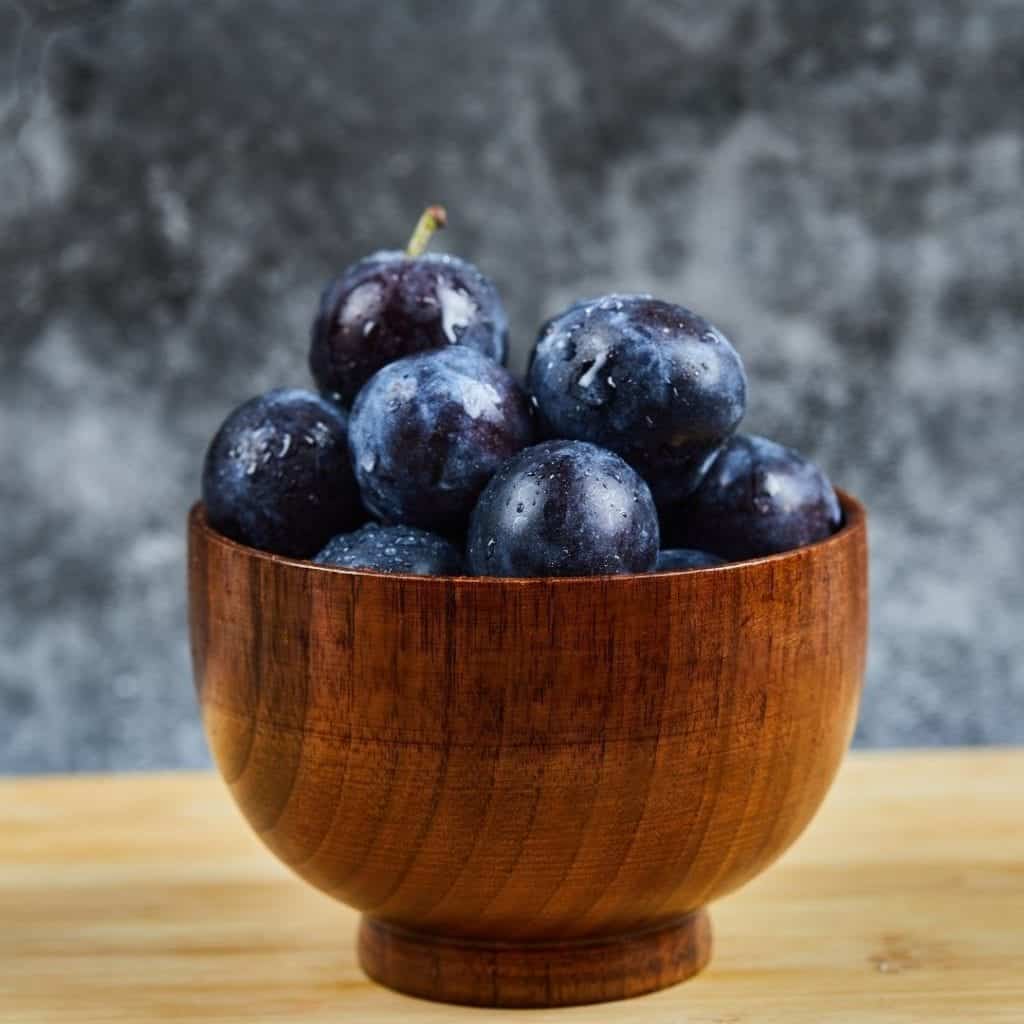
Plums
Delicious plums are another antioxidant rich food. Plump plums are sweet, juicy and refreshing, and pack just 30 calories each.
When it comes to their antioxidant content, they contain high levels of phenolic compounds, vitamin A and vitamin C.
Also, they're loaded with fiber, potassium and vitamin K.
Plums Health Benefits
So, in terms of health benefits, plums have lots to offer.
As well as providing you with antioxidant protection, they also:
- Enhance your brain function.
- Lower your blood pressure.
- Regulate your blood glucose levels.
- Strengthen your eyes.
- Support healthy digestion.
Pomegranates
Pretty pomegranates are a unique tasting fruit. In addition, they are plenty of fun to eat.
Moreover, a single pomegranate contains 234 calories.
In addition, high levels of the antioxidants' copper, manganese, vitamin C and vitamin E.
Pomegranates are also a fantastic source of fiber, phosphorus, potassium, vitamin K and multiple B vitamins.
Pomegranate Health Benefits
There are many reasons to love pomegranates. Certainly, one of the best antioxidant rich foods.
Not only do they provide your body with a healthy dose of antioxidants, but they also boost your health by:
- Lowering your blood pressure.
- Protecting against depression.
- Strengthening your bones and teeth.
- Strengthening your heart.
- Reducing blood levels of LDL cholesterol. (A type of cholesterol that restricts the flow of blood in the arteries and is often referred to as 'bad cholesterol').
Oranges
Refreshing oranges are a delicious citrus fruit. Above all, they contain the flavonoid, hesperetin, linked to improving memory and promoting brain health.
Oranges are also rich in vitamin C, an antioxidant. In addition, oranges have dietary fiber, folate, potassium and vitamin A. Vitamin C will help reduce inflammation and prevent cancer. Likewise, vitamin C also helps repair the skin.
Oranges are also high in other antioxidants, including vitamin A and beta-carotene. They are also an excellent source of iron, fiber, folate and potassium.
Orange Health Benefits
Vitamin C in oranges boosts the health and may help:
- Regulate the immune system.
- Fight cancer.
- Protect against infection, colds and flu.
Strawberries
Tasty strawberries, especially in wild strawberries, are high in antioxidants.
Strawberries Protect The Eyesight
Firstly, they have been shown to protect the retina of the eye and prevent cataracts in older adults.
Promote Brain Health And Improve Memory With Strawberries
Secondly, strawberries contain ellagic acid, which has antioxidative properties.
Moreover, it can improve memory and promote brain health.
Moreover, strawberry boosts health through its antioxidant properties. But also by their high vitamin C content.
Anti-Inflammatory Properties In Strawberries Help Reduce Pain
Strawberries are rich in flavonoids. For example, the main polyphenol in strawberries is a flavonoid quercetin, which contains anti-inflammatory properties.
Therefore, it may help reduce pain and inflammation.
💰 Get The Most Bang For Your Produce Bucks!
In short, If you're trying to increase your antioxidant intake, all these vitamin packed fruits are terrific choices. So, make sure you're eating at least one serving per day.
As such, this will help boost your immune system, protect against chronic disease and much more.
🗣️ What Is Your Favorite Antioxidant Rich Fruit?
Most importantly, I love vitamin and antioxidant rich fruits. So, what is your favorite vitamin and antioxidant-rich fruit, and why? Let me know in the comment section below.
You can also connect with me @EatYourNutrition on Instagram. I love seeing your photos. #EatYourNutrition #LauraVillanueva
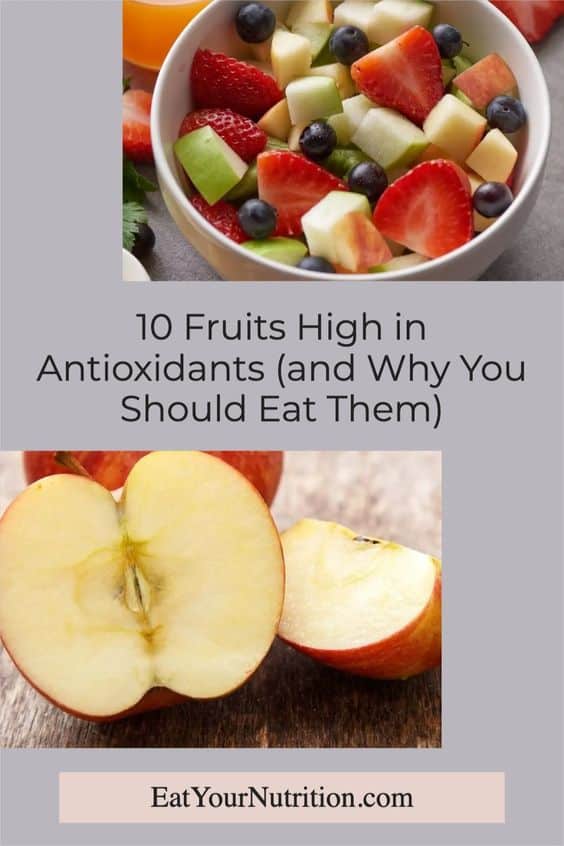
📚 References
- Kadum, H., Hamid, A., Abas, F., Ramli, N., Jaafar, A., & Pak Dek, M. et al. (2021). Using dates (Phoenix dactylifera l.) to improve energy metabolism in fatigue-induced Sprague Dawley rats. Future Foods, 4, 100077. doi: 10.1016/j.fufo.2021.100077
- Irandegani F, Arbabisarjou A, Ghaljaei F, Navidian A, Karajibani M. The Effect of a Date Consumption-Based Nutritional Program on Iron Deficiency Anemia in Primary School Girls Aged 8 to 10 Years Old in Zahedan (Iran). Pediatric Health Med Ther. 2019;10:183-188. Published 2019 Dec 19. doi:10.2147/PHMT.S225816


















Keva Hutsler says
Great Post.
Laura Villanueva says
Thank you so much. I appreciate knowing that others benefit from my nutrition and health tips.